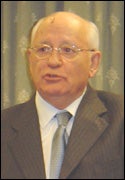BOSTON — After their first face-to-face meeting in 1985, President Ronald
Reagan and President Mikhail Gorbachev were debriefed by their diplomatic
delegations.
Each man was asked to assess his Cold War counterpart. Reagan called
Gorbachev a “die-hard Bolshevik”; Gorbachev saw Reagan as “a real
dinosaur.”
Not a good start. Fortunately, they got past first impressions. After
working long hours over the next few days, the men developed a rapport and
had the courage to question a MAD strategy.
 |
Mikhail Gorbachev Source: Mass Software Council |
Gorbachev relayed this anecdote to members of the Massachusetts Software Council and the Russian Software Industry Association here Tuesday to underline the point
that trust and cooperation are essential in an interconnected and
interdependent world.
“During the decade after the end of the Cold War, some of these bridges have
deteriorated and need renovation and repair,” Gorbachev said through an
interpreter. “Your meeting here, your discussion, is one of the new bridges
necessary to both our nations.”
Gorbachev’s remarks, which covered a range of topics and were punctuated by
his subtle humor, came almost exactly 20 years after he set government
restructuring (perestroika) and social reform (glasnost) in motion.
In some cases, subsequent Russian leaders moved too quickly, too slowly or
without focus. For example, Russia and India were both trying to establish
outsourcing industries at the same time. India made it a national priority. Russia did not and must now play catch-up.
But that doesn’t mean Russia’s IT industry is moribund. Last year, Russia’s
IT exports tallied $750 million. Counting the Ukraine, which still is
closely tied economically and culturally to Russia, the figure tops $1
billion.
Russia’s biggest asset is its highly educated and creative workforce, said
Joseph Feiman, vice president and research director at Gartner Group.
“All their employees have formal educations from universities,” Feiman told
the audience of 750 people. “Russians tend to hire engineers with three,
five or seven years of experience.”
In addition, Russian application development outsourcers are more inclined
to offer certification training (.NET, Java, Oracle database management)
than U.S. technology giants.
Costs are also lower. A developer earns about $14,000 per year in Moscow,
$12,000 in St. Petersburg and as low as $8,000 in other Russian cities,
Feiman said. Finally, the time difference to Western Europe — an important
market — is only a few hours.
Russia has obstacles to overcome if it is to take advantage of a second
chance at becoming an outsourcing hub. IT companies are smaller than in
many popular outsourcing countries, limiting the size of projects they can
take on.
The country also needs to invest more in marketing itself both to solicit
outsourcing work and to drum up foreign venture capital investment — something China has excelled at, Feiman said.
Gorbachev said President Vladimir Putin has pledged to build new technology
parks in St. Petersburg and Moscow and earmarked funds to help small and
medium businesses.
“I look with interest and hope at this process,” Gorbachev said, adding that
equal partnerships with Western European and U.S. firms will accelerate
Russia’s internal steps to jump-start IT.
“Without trust there is no cooperation,” Gorbachev said. “So lets work
together.”


